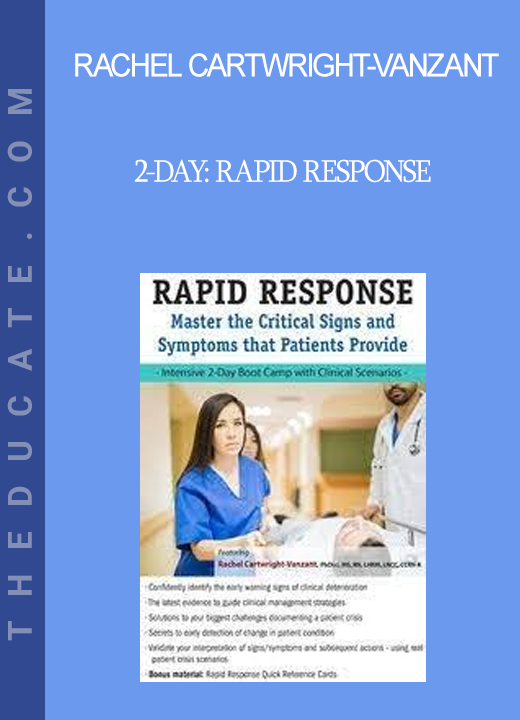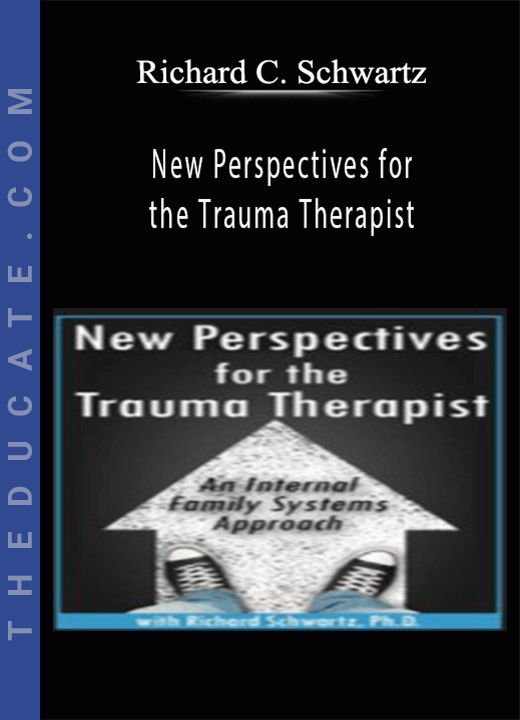Description
Rachel Cartwright-Vanzant – 2-Day: Rapid Response: Master the Critical Signs and Symptoms that Patients Provide
- Faculty:
- Rachel Cartwright-Vanzant
- Duration:
- 12 Hours 7 Minutes
- Format:
- Audio and Video
- Copyright:
- Dec 04, 2017
Description
- Confidently identify the early warning signs of clinical deterioration
- The latest evidence to guide clinical management strategies
- Solutions to your biggest challenges documenting a patient crisis
- Secrets to early detection of change in patient condition
- Validate your interpretation of signs/symptoms and subsequent actions – using real patient crisis scenarios
- Bonus material: Rapid Response Quick Reference Cards
You walk into your patient’s room. There is a sick feeling that something just isn’t right. Do you dismiss this internal radar? OR… do you listen to your intuition and begin investigating? Recognizing early signs and symptoms of something going wrong is your best defense legally and your best response clinically to prevent a poor outcome for your patient. The better you understand how and why the body responds to “things not working right”, the earlier you can take the steps to intervene and possibly prevent the progression leading to an unfavorable outcome that may include death. Yes! Patients have died because of failure to rescue when the signs and symptoms were clear in the medical record.
This two-day intensive educational event will provide numerous clinical situations that represent all body systems that can and have led to poor outcomes because the signs and symptoms either were not recognized or were not treated appropriately. You will also learn from an expert in documentation how to chart when something goes wrong with your patient. Documentation is just as important as the care you provide and you will learn how to do just that as well.
Handouts
| Manual ZNM077570 (10.38 MB) | 144 Pages | Available after Purchase |
Outline
Immunology/Hematology: DIC | HIT | Transfusion reactions
- Bleeding usually stops quickly. How do you know when to be concerned?
- Demystify the complex web of clotting
- Most transfusion reactions are minor.
- What if the reaction is immediate/major?
- Do you know what to do?
Cardiovascular: Pulse pressure | Recognition of valvular heart disease | Recognition of ACS | Complication of PCI | Hypertensive crisis | Acute vascular insufficiency | Cardiac trauma | Aneurysms
- Calculate pulse pressure in a case study
- Recognize audibly and identify anatomic locations for valvular dysfunction (sound examples)
- List key urgent steps to take when you recognize ACS
- My back hurts! My foot is numb! My chest hurts again!
- When is a BP “too” high? Every patient is different…
- Your MVA patient on a M/S floor may look OK on the outside – but inside can be another thing!
Endocrine: SIADH | DI | Ketoacidosis and HHS | Hypoglycemia
- Too much water, too little water. What does it all mean?
- Too much insulin, too little insulin. Can’t keep it straight?
Gastrointestinal: GI bleed | Acute pancreatitis | Liver failure and encephalopathy | Abdominal trauma | Bowel infarction, obstruction and perforation
- 5 tips to correctly identify significant nonspecific abdominal pain
- When confusion is not just getting old!
- All backed up and nowhere to go, can kill your patient. Don’t miss key findings that can save them
Behavioral / Psychosocial: Delirium | Dementia | Suicide | Substance withdrawal
- Nurses can affect the double “Ds”
- Would you recognize suicide intent in your patient?
- The substance your patient abuses affects the presenting symptoms of withdrawal
Neurology: Encephalopathy | Stroke | TBI | Skull fracture | Seizure | Meningitis
- 5 clues to encephalopathy
- Embolic vs. ischemic stroke
- When the brain swells, the skull leaves no room for guessing. Early s/s of neuro problems
- Seizures may come about suddenly – and sometimes they don’t stop
Renal: Acute renal failure | Life-threatening electrolyte imbalance
- What the kidneys do with all those electrolytes. Why it matters
Pulmonary: Perfusion | Acute respiratory failure | Status asthmaticus | Pulmonary embolism | Pneumonia | Aspiration | Pneumothorax | Hemothorax
- Early detection that enough oxygen is not getting to the blood stream
- Toxic substances interfering with oxygen exchange
- Rapid detection of a pneumothorax and hemothorax
Multisystem: Hypovolemic, Hemorrhagic, SIRS, Sepsis, and Septic shock | Anaphylactic shock
- 5 tips to recognizing s/s of early shock and possible etiologies
- Support failing compensatory mechanisms in a deteriorating patient
Faculty
Rachel Cartwright-Vanzant, MS, RN, CNS, LHRN, LNCCRelated seminars and products: 7
Rachel Cartwright-Vanzant, MS, RN, CNS, LHRN, LNCC, has nearly three decades of clinical, management and consulting experience. Rachel is a legal nurse consultant certified (LNCC), a licensed healthcare risk manager (LHRM) and she holds a forensic nurse certificate (FNC). As a legal nurse consultant, Rachel works with attorneys, law firms and healthcare organizations to review and evaluate medical records for compliance with standards of care and regulations posed by accreditation agencies, including The Joint Commission. In addition to her legal insights, Rachel draws from vast clinical experiences, including work in: critical care, renal transplant, dialysis and surgical settings.
Disclosures:
Financial: Rachel Cartwright-Vanzant is receiving a fee for speaking at this educational activity.
Nonfinancial: Rachel Cartwright-Vanzant has no relevant nonfinancial relationships to disclose.







Reviews
There are no reviews yet.